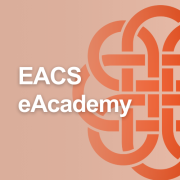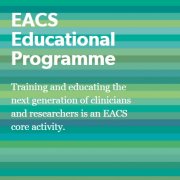Antiretroviral Therapy
1 September - 8:30-9:00
With currently available antiretroviral therapy (ART), most people with HIV achieve and maintain viral suppression, and HIV has become a chronic, manageable condition. This session will cover current treatment strategies and clinical guidelines with a focus on the optimal management of people with HIV. An update on the clinical role of new and investigational agents will also be presented.
Speaker: Dr Nicola Mackie (UK)
Establishing a research question and choosing an appropriate study design
1 September - 9:00-9:30
The research question is a pivotal part of the scientific process and is at the heart of providing evidence to support or refute our hypotheses. An appropriately designed study is absolutely essential in order to answer the research question. This lecture will focus on the steps needed to establish a research question, knowing that this process depends on many points of consideration, such as previous studies, clinical importance, and feasibility. We will also cover the various study designs (e.g., randomized clinical trials, observational cohorts, cross-sectional studies, etc.) that can be used to get as close as possible to answering the research question.
Speaker: Dr Anders Boyd (Netherlands)
Co-morbidities
1 September - 9:30-10:00
Co-morbidities remain a major cause of morbidity and mortality in people with HIV worldwide. Many co-morbidities are impacted by ageing, the effects of chronic HIV infection and its treatment. This plenary will cover the major co-morbidities experienced by people with HIV, outline new advances in these areas - including the emerging field of precision medicine - and provide a structure for monitoring and management to lessen the impact of co-morbidities on long-term outcomes of people with HIV.
Speaker: Prof. Paddy Mallon (Ireland)
Resistance & management of unsuppressed viraemia
2 September - 8:30-9:00
Current antiretroviral treatments control viral replication, leading to maintenance of a plasma viral load <50 copies/mL (virological success). Adherence difficulties and viral resistance are associated with virological failure, with plasma viral loads >50 copies/mL (virological failure). In this session, we'll discuss the clinical, virological, and therapeutic approach to be applied in situations of virological failure. We'll talk about the new molecules of interest in this situation. We will also discuss the management of low-level viraemia.
Speaker: Dr Romain Palich (France)
Hypothesis testing, p-values and confidence intervals
2 September - 9:00-9:30
Presentations of data in the medical world are littered with p-values. But what do these p-values really tell us, and is a p-value <0.05 really that important? In this lecture, we will start by illustrating how the p-value can help us to differentiate real findings from associations which may occur by chance. We will then demonstrate the general principle of hypothesis testing, using worked examples to illustrate not only how they can be interpreted, but also some of the problems that may be encountered when relying solely on p-values for this purpose. We will then demonstrate how confidence intervals can be used to supplement the information that is provided by the p-value. Participants will then have the opportunity to put their knowledge into practice using real-life examples from the published literature.
Speaker: Dr Tracy Glass (Switzerland)
Conception, pregnancy, delivery, and breastfeeding
3 September - 8:30-9:00
This lecture will review current practice, guidelines, and the evidence base for the management of HIV in conception, pregnancy, delivery, and breast/chestfeeding. The review will be global and will examine health inequalities created by differences in practices across different world regions.
Speaker: Prof. Yvonne Gilleece (UK)
Getting it wrong – errors in statistical tests and why do we need well-powered studies
3 September - 9:00-9:30
Whenever we undertake a statistical test and interpret the resulting p-value, there is always a chance that our conclusion will be incorrect – we may either conclude that there is a real effect present even if this is not the case, or that there is no real effect present when, in fact, there is one. This reflects the fact that our analyses are based on samples of a much larger population. This talk will take the audience through the different errors that can be made when interpreting p-values and will investigate the ways that the risk of making such errors can be reduced.
Speaker: Prof. Caroline Sabin (UK)
Cancers
3 September - 9:30-10:00
Cancer, both AIDS-defining and non-AIDS-defining cancers (NADCs), has become the leading cause of death in people living with HIV, associated with an increase in the incidence of some NADCs compared to the general population, including lung cancer, hepatocellular carcinoma, head and neck cancers, anal cancer, and Hodgkin lymphoma. Incidence of NADCs should be expected to increase further as the PLWH population continues to age. This session will provide an update on epidemiology and the identification of risk factors to determine the most appropriate prevention and screening strategies in this population. Cancer management in HIV patients is based on general recommendations, with specific attention to comorbidities or drug interactions, and some special considerations for cancer treatment in these patients will be discussed.
Speaker: Prof. Stéphane De Wit (Belgium)
Body weight increase and adipose tissue
3 September - 11:00-12:00
ART-related alterations in body fat amount and repartition have long been described in people living with HIV. At present, most are treated with the class of integrase inhibitors (INSTIs, dolutegravir, bictegravir) with one or two NRTIs (often TAF). However, INSTIs and TAF are associated with weight gain in ART-naïve and ART-experienced individuals. The level of increase is generally moderate and not clinically meaningful. However, in some cases, mainly women, people living with HIV of Black ethnicity, this level is worrying. Indeed, weight gain leads to an increased risk of cardiometabolic complications, hypertension, diabetes, liver steatosis/steatohepatitis, cardiovascular disease. Novel antidiabetic GLP-1 receptor agonists are effective in reducing weight and cardiometabolic complications.
Speaker: Prof. Jacqueline Capeau (France)
Opportunistic infections
4 September - 8:30-9:00
Expanding ART access has reduced opportunistic infections (OIs), yet OIs persist in people with HIV presenting late or experiencing virologic failure. This lecture reviews key OIs, with updates on diagnostics and treatment. Topics include urinary LAM and Xpert Ultra for TB, short-course rifapentine-based regimens, the BPaLM regimen for MDR-TB, and single-dose liposomal amphotericin B for cryptococcal meningitis. The relevance of monkeypox as an OI and emerging data on CMV will also be discussed. Emphasis will be placed on translating advances into practice across diverse healthcare settings.
Speaker: Prof. Sanjay Pujari (India)
Key sources of bias and tips on what to look for in a paper
4 September - 9:00-9:30
When conducting a study, we will obtain a study population, constitute groups of individuals who are exposed and unexposed to a given intervention, treatment, or factor, and compare the occurrence of an outcome between these exposed and unexposed individuals. At each of these steps, certain things can happen that might take us further away from answering the research question. These are generally considered biases. This lecture will focus on the sources of several common biases found in clinical research. We will also cover how to report these biases when drafting research manuscripts and how to look for them in a paper.
Speaker: Dr Anders Boyd (Netherlands)
Management of liver disease in people living with HIV
4 September - 9:30-10:00
Liver disease remains a major cause of morbidity and mortality in HIV-positive individuals. This session will provide an update on the epidemiology of viral hepatitis and HIV co-infection. An update on the current and future management of HBV will be discussed. Directly Acting Antivirals (DAAs) against HCV have revolutionised HCV management. Micro-elimination in subgroups of patients may be a realistic possibility in the near future. However, there are barriers that need to be overcome. Metabolic-associated fatty liver disease (MAFLD) is an increasingly recognised problem over recent years. Understanding the pathophysiology and natural history in HIV-positive individuals will be important in order to design optimal management pathways.
Speaker: Prof. Sanjay Bhagani (UK)

EACS Guidelines update now available!
The EACS v13.0 and the app are available for free on


Educational Programme
Training and educating the next generation of clinicians and researchers is an EACS core activity.